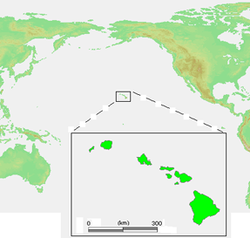Territory of Hawaii
| Territory of Hawaii Panalāʻau o Hawaiʻi |
||||||
| Organized incorporated territory of the United States | ||||||
|
||||||
|
||||||
| Territory of Hawaii | ||||||
| Capital | Honolulu | |||||
| Government | Organized incorporated territory | |||||
| Governor | ||||||
| • | 1900–1903 | Sanford B. Dole | ||||
| • | 1957–1959 | William F. Quinn | ||||
| Military Governor | ||||||
| • | 1941–1944 | Maj. Gen. T. H. Green | ||||
| History | ||||||
| • | Monarchy overthrown | January 17, 1893 | ||||
| • | Annexed by the US | August 12, 1898 | ||||
| • | Organic Act | 1900 | ||||
| • | Martial law | 1941–1944 | ||||
| • | Revolution of 1954 | 1946–1958 | ||||
| • | Statehood | August 21, 1959 | ||||
The Territory of Hawaii or Hawaii Territory was an organized incorporated territory of the United States that existed from August 12, 1898, until August 21, 1959, when its territory was admitted to the Union as the fiftieth U.S. state, the State of Hawaii. The Hawaii Admission Act explicitly specified that the State of Hawaii would not include Palmyra Atoll, The Midway Islands, Johnston Atoll, Sand Island (off-shore from Johnston Island), or Kingman Reef.
The U.S. Congress passed the Newlands Resolution which annexed the Republic of Hawaii to the United States. Hawaii's territorial history includes a period from 1941 to 1944—during World War II—when the islands were placed under martial law. Civilian government was dissolved and a military governor was appointed.
Upon the overthrow of Queen Liliʻuokalani in 1893, the Committee of Safety led by Lorrin A. Thurston established the Provisional Government of Hawaii to govern the islands in transition to expected annexation by the United States. Thurston actively lobbied Congress while the former monarchy lobbied Democrats to protest.
First annexation proceedings began when Democrat Grover Cleveland took office. Cleveland was an anti-imperialist and was strongly against annexation. He withdrew the annexation treaty from consideration, mounted an inquiry, and recommended the restoration of Liliʻuokalani as queen. Further investigation by Congress led to the Morgan Report, which established that the actions of U.S. troops were completely neutral, and exonerated the U.S. from any accusations of complicity with the overthrow.
...
Wikipedia



